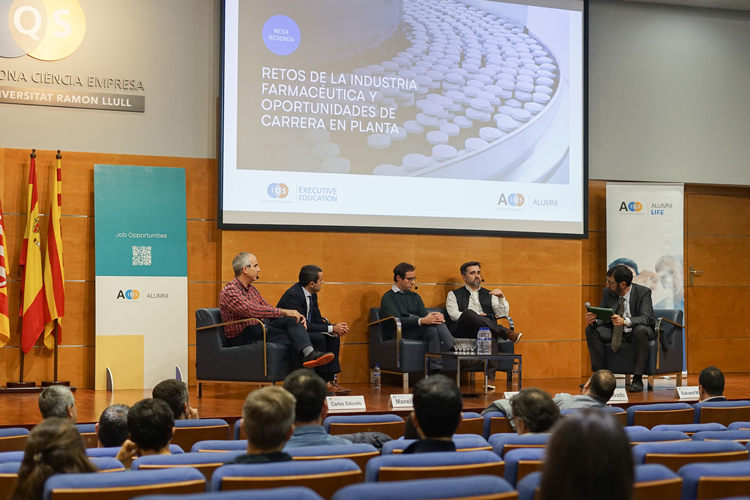Experts from Catalonia’s pharmaceutical industry met at IQS to address today’s most pressing topics in the roundtable discussion “Challenges of the pharmaceutical industry and career opportunities at the plant.” The event was organized by IQS Executive Education, which recently launched the Postgraduate Programme in Pharmaceutical Plant Engineering.

Experts from Catalonia’s pharmaceutical industry met at IQS to address today’s most pressing topics in the round table discussion “Challenges of the pharmaceutical industry and career opportunities at the plant.”. The event was organized by IQS Executive Education, which recently launched the Postgraduate Programme in Pharmaceutical Plant Engineering.
Moderated by Eduard Martí, the Managing Partner of Codols Technology, the debate featured renowned experts from the pharmaceutical industry in Catalonia: Manel Vera (People & Culture Director Spain at Technip Energies), Pol Salvado (Facility Plant Manager at Almirall), Marcos Serra (Pharma Transformation Manager at Towa), and Carles Salcedo (coordinator of the Postgraduate Programme in Pharmaceutical Plant Engineering and technical director at KLINEA).
After the presentations, Martí, who combines his work at Codols Technology with leading the Professional Groups at AIQS, raised the first topic for debate among the participants: what changes and challenges are taking place in the pharmaceutical industry, both in the sphere of human resources, as well as in production costs and the future of companies in the sector?
Pol Salvado stressed the current need for companies to change their way of doing business and to adapt to an increasingly uncertain future: “We have to start thinking about what the products will be in 10 years time, we have to wonder whether distribution will be the same or will change. We’re on a path towards personalized medicine. One of the great challenges is to start thinking of everything long term and not stick with today’s strategies and processes.”
The delicate economic situation caused by the war in Ukraine is also directly affecting pharmaceutical companies. Along these lines, Marcos Serra wanted to talk about the changes that people are facing: “This is a highly regulated sector, but today there are enormous cost increases due to issues like rising energy prices and inflation. It’s a time of great uncertainty.”
Technological changes in the sector
Companies have had to tailor themselves to technological changes in recent years. Digitalization today is required for entities to work better and several of them have had to adapt by hiring new types of professionals on their staff.
Carlos Salcedo appealed to the knowledge of new generations to be able to move forward together in an industry that has had to adapt to new times: “Professionals who have been in the industry for 10 years have major difficulties in adapting to today’s methods, that’s why we need to add new profiles to the sector.” Manel Vera’s statements went in the same direction, highlighting the importance of the digitalization process in a market that requires flexibility and speed: “We sell knowledge. We want people to have a grasp of data and we should make an effort to get ‘digitalized.’ Being competitive in terms of software is essential,” he stated.
Recruiting new talent
Finally, the participants spoke about job opportunities in the sector and the possibility of hiring new talent capable of facing the challenges in today’s sector.
Companies have had to adapt and one of the new personnel recruitment strategies now involves showcasing their achievements and projects on digital platforms: Salvado talked about how they do this at Almirall: “If you are active on LinkedIn and other social media, talented people see how you do things and pay attention to your activities. When you are looking for a specialist, they already know about you and arrive with a more willing mindset to join your project”. Today it is much easier to contact and hire qualified professionals. Social media is a great tool. Including remote working as an option also attracts talent to join new projects. Manel Vera believes that this is a competitive advantage: “With remote work we can adapt and find talent anywhere in the world,” he concluded.










